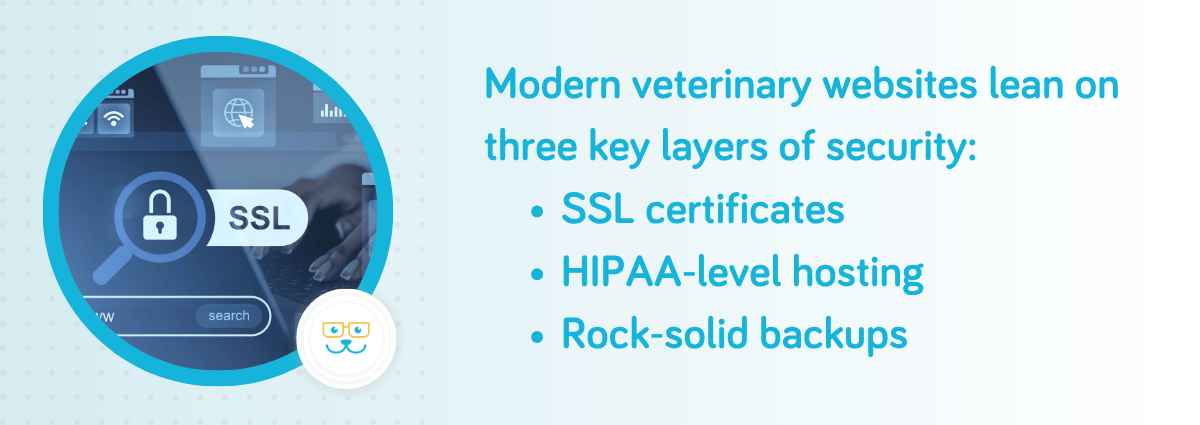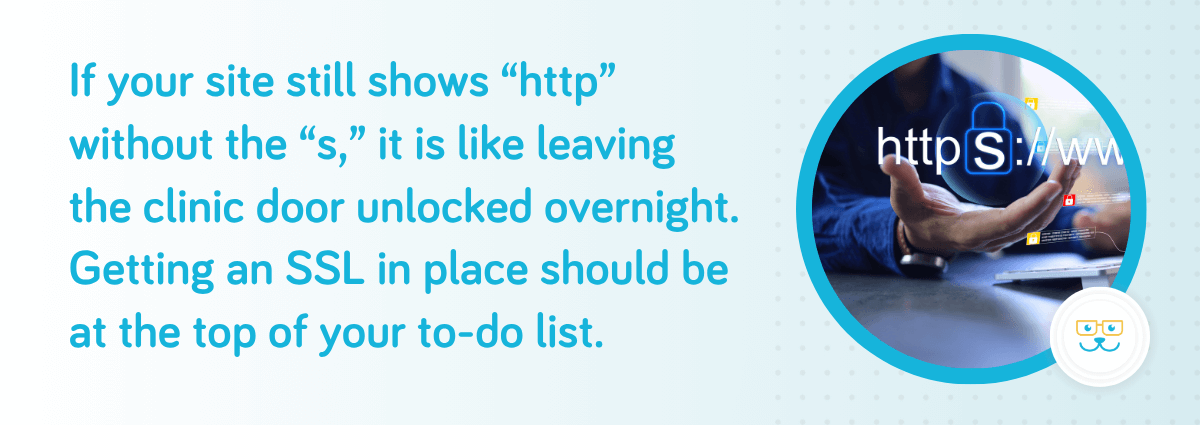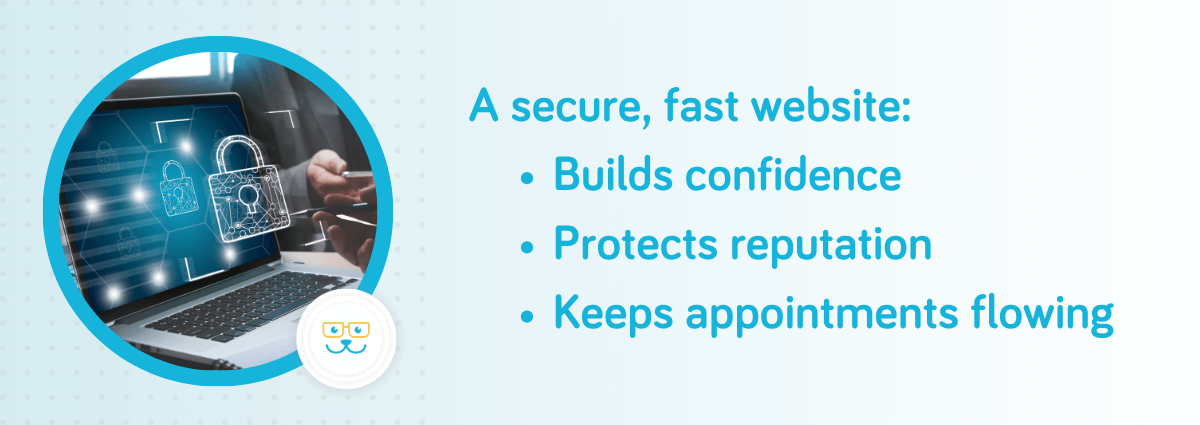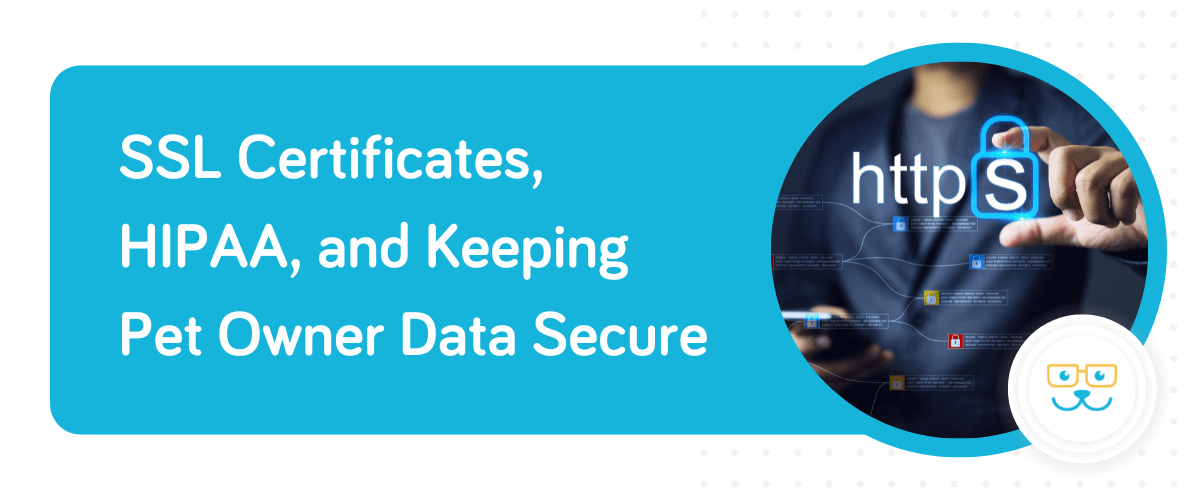SSL Certificates, HIPAA, and Keeping Pet Owner Data Secure
Picture this: a worried pet parent lands on your website at 11?p.m., crying baby in one hand and a limping Labrador in the other.
They fill out your appointment form, type a few quick notes about the limp, and hit Send. At that moment, they are trusting you with their pet’s well?being and their own personal info. Your website has to protect both.

That is why modern veterinary websites lean on three key layers of security:
- SSL certificates
- HIPAA?level hosting
- Rock?solid backups
Let’s break down what each one does, why it matters to your practice, and how you can make sure your digital front door is every bit as safe as your exam rooms.
1. SSL Certificates: The Lock on Your Digital Front Door
Ever notice the little padlock and “https” in a browser bar? That is your SSL certificate at work. In plain English, SSL encrypts everything a pet parent types on your site, names, phone numbers, medical notes so anyone snooping between their device and your server sees nothing but scrambled code.
Why it matters
- Stops data thieves from reading form submissions
- Removes scary browser warnings that make visitors bounce
- Boosts your Google ranking since search engines favor secure sites

If your site still shows “http” without the “s,” it is like leaving the clinic door unlocked overnight. Getting an SSL in place should be at the top of your to-do list.
2. HIPAA?Level Hosting: Because People Fill Out Your Forms
True, HIPAA is designed for human healthcare. However, pet owners hand over a significant amount of their personal data every time they request an appointment or refill. They deserve the same respect and protection they’d expect from their own doctor.
Hosting on HIPAA?caliber infrastructure means:
- All submitted forms live on secure, access?controlled servers
- Data travels through encrypted channels, not plain text
- Activity logs verify who accessed what and when
When you can honestly say “our site meets human?health security standards,” trust skyrockets.
3. Daily, Off?Site Backups: Your Website’s Emergency Plan
Even with strong locks and sturdy walls, accidents can still occur. An update glitches. A team member deletes the wrong page. Or the hosting provider has a rare outage. Without a recent backup, you could spend days rebuilding your site, losing appointments the whole time.
A veterinary?grade backup routine looks like this:
- Daily copies are saved on a separate server
- Weekly off?site copies stored in a different data center (think safety deposit box)
- Ninety?day archive so you can roll back to earlier versions if needed
- Pre?update backups are taken before any code change, so fixes are a click away
- Rapid restore that brings a site back online in minutes, not days
That is the digital equivalent of having duplicate, well-organized patient files ready to go in case a fire or flood hits the clinic.
How to Check If Your Website Passes the “Triple Shield” Test
Grab a coffee, open your browser, and run through this five?minute audit:
- Look for the padlock in front of your URL in the search bar. If you do not see it, your site may be missing an SSL certificate, or it may have expired.
- Submit a test form. Does the confirmation page load at “https”? If it flips to “http,” your SSL is only partly covering your site.
- Ask your host about HIPAA?level security. They should be able to explain encryption, access controls, and audit logs without hesitation.
- Request the latest backup report. You want to hear “daily, off?site, and retained for at least thirty days.”
- Find out the restore time. Anything longer than an hour in an emergency puts appointments at risk.
If any answer feels vague or leaves you uneasy, flag it for follow?up. Security gaps rarely fix themselves.
A Few Pro Tips for Extra Peace of Mind
- Renew SSL automatically. Manual renewals lapse on holidays and vacation days. Your domain provider will usually do the initial certificate setup, check with them if you are unsure.
- Use Cloud?based firewalls. Services like Cloudflare block known bad actors before they reach your server and can speed up site load times.
- Keep software updated. Outdated plugins and themes create holes hackers love. Schedule monthly maintenance or let your provider handle it for you.
- Educate your team. Phishing emails and weak passwords defeat even the best tech safeguards.
Why All This Matters to Pet Owners

Security might feel like tech jargon, but it has a real?world impact. A secure, fast website:
- Builds confidence. Clients can tell when a site is modern and trustworthy.
- Protects your reputation. Data breaches spread quickly on social media.
- Keeps appointments flowing. Downtime means lost calls and online requests.
In other words, the time and resources you invest in an SSL certificate, HIPAA?level hosting, and solid backups pay you back with client loyalty and uninterrupted revenue.
Protecting Trust Starts Online
Need help assessing your setup? Book a free Marketing Health Exam and let us take a look. Whether you’re already in great shape or need a few updates, we’ll walk you through the next steps so you can focus on what you do best: caring for pets.
Book Your Complimentary Marketing Health Exam
Want more tips like this every week?
Subscribe to the GeniusVets Weekly Newsletter and get fresh insights, free resources, and veterinary marketing strategies delivered straight to your inbox.

